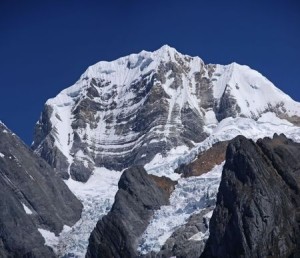The Limits of the Soul

“That’s it. I’m dead.” These were the thoughts Joe Simpson had when he realized the pain he felt from his fall on Siula Grande in the Andes meant his leg was broken. But that wasn’t the end. His climbing partner, Simon Yates repeatedly lowered him almost three thousand feet down the mountain; at night; in a snowstorm. And with what might have been their last lowering, Joe went off an overhanging ice wall.
The wind and the storm meant they had no way of communicating with each other. Simon just held on. About an hour after Joe went over the drop, Simon was slowly losing his grip on the rope. He realized he couldn’t hold on much longer and couldn’t stop it from slipping from his grasp. “The thought overwhelmed me. . . . I was being pulled off.” And then he did the unthinkable—he cut the rope.
When Simon came down off the ice wall the next morning, the storm had lifted and he could see where Joe had fallen into a crevasse. There was no thought to look for him; of course Joe was dead. As he descended, Simon felt a sense of menace. “It was as if the mountains were holding their breath, waiting for another death. Joe had died. The silence said so; but must they take me as well?” But Simon didn’t die on Siula Grande. He made it back to their camp. And Joe wasn’t dead either.
In the bottom of the crevasse, at first Joe thought that he wouldn’t get out. “I just cried and cried. I thought I’d be tougher than that.” He said he had been brought up as a devout Catholic, but had long since stopped believing in God.
“I always wondered if things really hit the fan, whether I would under pressure say a few Hail Mary’s and say: ‘Get me out of here.’ It never once occurred to me. It meant that I really don’t believe. And I really do think that when you die, you die. There really is no afterlife; there’s nothing.”
But Joe did climb out of the crevasse. And after getting out of the crevasse and looking at the glacier he had to descend, he thought, “There’s just no way you’re going to physically do that.” And then he began to crawl back to their camp. “I didn’t crawl because I thought I’d survive. I wanted to be with somebody when I died.”
It was as if there were two minds within him. “The voice was clean and sharp and commanding. It was always right, and I listened to it when it spoke and acted on its decisions.” The other mind was a disconnected series of images, memories and hopes. “The voice (emphasis in the original) told me exactly how to go about it, and I obeyed while my other mind jumped abstractedly from one idea to another.”
The voice would tell him to reach a certain point in half an hour and he obeyed. Other voices wondered what people were doing back home in Sheffield. He hoped his Ma was praying for him as she always did. The lyrics to a pop song filled his head. Then the voice would say he was late, and then he would wake and start to crawl again. “I was split in two. A cold clinical side of me assessed everything, decided what to do and made me do it. The rest was madness.”
He continued crawling until he realized he’d crawled into the latrine area of their camp. So he called out; but there was no answer. “And when I shouted and they weren’t there, I knew I was dead then. That moment, when no one answered the call; it was … I lost me.” But Simon and another man were there and they heard him.
Joe Simpson was climbing again within two and a half years. He wrote the story of this climb in what has become a classic tale in the world of mountaineering, Touching the Void. In a movie by the same name (which is available on Netflix), Joe said: “It was fun; it was just brilliant fun. And every now and then it went wildy wrong; and it wasn’t.”
There is a religious impulse in me that wants to rush in, point to the voice, and say “Look, Joe! That was God!” But if God had wanted Joe to recognize Him in the voice, He would have spoken clearly then to Joe. Biblically, then, this stands as an example of the truth of Romans 1:19, “For what can be known about God is plain to them, because God has shown it to them.” Joe’s incredible story of survival can be used as a parable of how God hears and saves us when we finally know we’re lost; or not.
If you balk at finding God here, reflect on the mysteries this epic reveals about the human soul. The Greek philosopher Heraclitus said: “You will not find the limits of the soul, though you take every road; so deep is the tale of it.” I think T. M. Luhrmann’s thoughts as she concluded her book When God Talks Back could also be helpful:
In the end, this is the story of the uncertainty of our senses, and the complexity of our minds and the world. There is so little we know, so much we take on trust. In a way more fundamental than we dare appreciate, we must each make our own judgments, about what is truly real, and there are no guarantees, for what is, is always cloaked in mystery.
